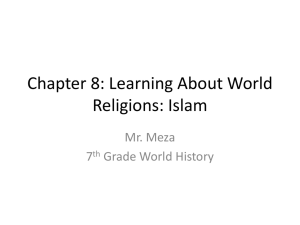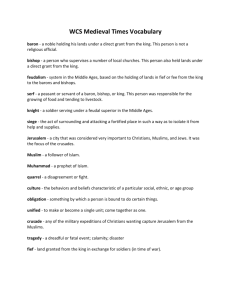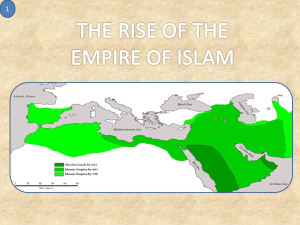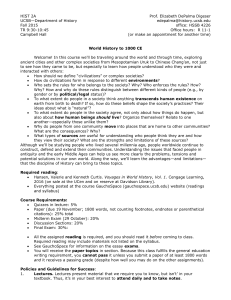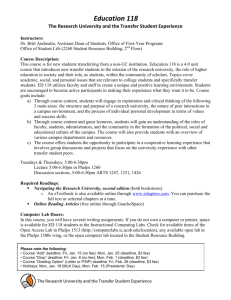RS 140E syllabus Spring 2013 - Department of Religious Studies
advertisement
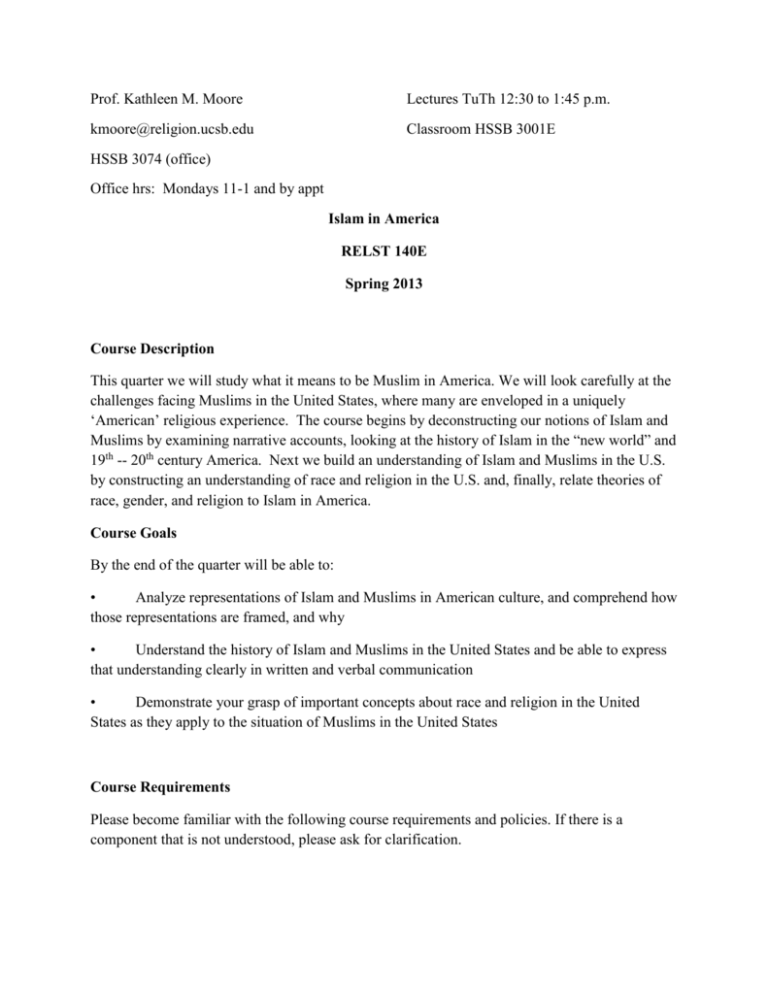
Prof. Kathleen M. Moore Lectures TuTh 12:30 to 1:45 p.m. kmoore@religion.ucsb.edu Classroom HSSB 3001E HSSB 3074 (office) Office hrs: Mondays 11-1 and by appt Islam in America RELST 140E Spring 2013 Course Description This quarter we will study what it means to be Muslim in America. We will look carefully at the challenges facing Muslims in the United States, where many are enveloped in a uniquely ‘American’ religious experience. The course begins by deconstructing our notions of Islam and Muslims by examining narrative accounts, looking at the history of Islam in the “new world” and 19th -- 20th century America. Next we build an understanding of Islam and Muslims in the U.S. by constructing an understanding of race and religion in the U.S. and, finally, relate theories of race, gender, and religion to Islam in America. Course Goals By the end of the quarter will be able to: • Analyze representations of Islam and Muslims in American culture, and comprehend how those representations are framed, and why • Understand the history of Islam and Muslims in the United States and be able to express that understanding clearly in written and verbal communication • Demonstrate your grasp of important concepts about race and religion in the United States as they apply to the situation of Muslims in the United States Course Requirements Please become familiar with the following course requirements and policies. If there is a component that is not understood, please ask for clarification. Required Readings: These titles are available for purchase at the UCEN Bookstore, the I.V. Bookstore, and from online booksellers. They are also on reserve (2 hour loan) in Davidson Library: • Kambiz GhaneaBassiri, A History of Islam in America (Cambridge, 2010) GHANEABASSIRI • Yvonne Y. Haddad, Jane I. Smith, and Kathleen M. Moore, Muslim Women in America: Challenges of Islamic Identity Today (Oxford Univ. Press,2011 [2006]) HADDADSMITHMOORE • Fish, Steven M. Are Muslims Distinctive? A Look at the Evidence. Oxford University Press, 2011. FISH In addition required articles are accessible online at www.gauchospace.ucsb.edu and are listed below in the course schedule. Gauchospace: The Gauchospace web-based course management system will be used to post grades, messages and reading assignments that are required in addition to the four books. Required readings (except for the four books) are accessible on the website: www.gauchospace.ucsb.edu. Evaluation: Your grade is based on how well you synthesize readings, lectures, and audiovisual materials. Success depends on your engagement with the materials. Coming to class prepared to discuss the readings is essential. Components of the grading scale are as follows (200 point scale): Grades Points Grading Scale Midterm Exam 60 A: 177 -- 200 Final Exam 100 A-: 171 -- 176 Participation 40 B+: 165 -- 170 B: 158 -- 164 Total: 200 B-: 152 -- 157 C+: 146 -- 151 C: 139 -- 145 C-: 133 -- 138 D: 114 -- 132 F: 0 -- 113 Exams: The midterm (30% of course grade) and final exam (50% of course grade) will include fill-in-the-blank and essay questions. These exams will be on the reading assignments, lectures, and audio-visual materials introduced in class meetings and on the Gauchospace website. Please bring a blue book to exams. Participation: Your participation (20% of course grade) will be evaluated on the basis of in-class discussions and short weekly papers. Bi-weekly papers (typed, double-spaced) will consist of one paragraph about the main thesis of the authors assigned for the week; one paragraph about how the past two week’s readings relate to previous weeks’ materials; and two questions or comments you have about the assigned readings for the week. The goal is to synthesize the materials so that you can raise analytical questions. Bring weekly papers to class on due date and use them as “talking points” to contribute to the in-class discussion. Four bi-weekly papers are assigned and I will drop the lowest score (so your grade is based on three). BRING PAPERS TO CLASS WITH YOU on due dates. Do not submit weekly papers by email – turn them in during class. Due dates are indicated below. Attendance at class is very important. You are responsible for materials presented in lectures and discussion. To avoid any confusion, here is what I expect for various grades: A: Superb ability to offer original and insightful analysis of the facts. B: Solid, very good work. The facts have been grasped and significant moves have been made to analyze the materials. C: Reasonable efforts made to attend class, and a fair grasp of the materials has been demonstrated. Analytical level is fair – not original, missing certain important facts, but essentially correct about the facts covered. D: A simplistic familiarity with the material is demonstrated by the student’s work, but of what is presented could have been gleaned from media (not course assignments) much F: Little or no attempt made to engage with the materials, to respect the requirements of the course and its schedule, or to complete assignments on time. 2013 Course Schedule April 2, 2013 Introduction (read syllabus and purchase books) Overview: Immigration, Slavery, and Islam’s American Roots: Earliest Years April 4 Read: GHANEABASSIRI, pp. 1-94 April 9-11 Religious Freedom, Slavery, and Muslims in America 18th to early 19th century Read: MPAC-Muslims and the Making of America, pp. 1-92 First weekly paper due in class April 11 April 16-18 Contested Citizenship, late 19th to early 20th century Read: GHANEABASSIRI, pp. 95-164 (4/16) GHANEABASSIRI, pp. 165-227 (4/18) April 23 -25 Post World War II American National Identity and Transnationalism Read: Kathleen Moore, “Pakistani Americans” and “Da’wa” GHANEABASSIRI, pp. 228-271 Second weekly paper due in class April 25 April 30- Organizing Muslims in America, middle to late 20th century May 2 America” Read: GhaneaBassiri, pp. 272-326 and Kathleen Moore, “Muslim Advocacy in May 7 MIDTERM (bring blue book) May 9 In-Class Screening of “The Noble Struggle of Amina Wadud” (2007) May 14-16 Local Experience, late 20th to early 21st century Read: GHANEABASSIRI, pp. 327-377 (5/14) and Aisha Pena, “Protecting Muslim Civil and Human Rights in America” (5/16) May 21-23 Contemporary Problems Read: Charles Kurzman, et al., “The Problem of Terrorism” (5/21) and FISH, pp. 3-68, 133-171 (5/23) Third weekly paper due in class May 23 May 28-30 Becoming American in a Pluralist Society: the end to immigrant memory? Read: FISH, pp. 173-228 (5/28) HADDADSMITHMOORE, pp. 3-60 (5/30) June 4-6 Women’s Production of Islamic Roles and Knowledge in America Read: HADDADSMITHMOORE, pp. 61-100 (6/4) HADDADSMITHMOORE, pp. 101-164 (6/6) Fourth weekly paper due in class June 6th Course Policies Make-up Exams: Make-up exams will be allowed only in the event of a medical or family emergency and with advance notification. Documentation is required for all make-up exams. As soon as you know that you will miss an exam you need to get in touch with me to schedule a make-up. A long delay in informing me of your situation may result in not being allowed to take a make-up. Attendance: Your presence is expected at every class. You are required to turn in your weekly paper in class (I will not accept electronic submissions) and to contribute to in-class discussions. Extra Credit: Opportunities to earn extra credit will be announced during the quarter. Events will be announced in class and put on the Gauchospace web site. For each extra credit event you attend you will earn three points. You may earn up to nine points for attendance at extra credit events, to be added to your final exam grade. Assistance: Please visit during office hours; make an appointment, or e-mail if you require assistance or wish to discuss the class material further. Electronic Gadgets in the Classroom: Turn off all cellphones and other noise making devices before class. You are allowed to bring a laptop computer to class for the purpose of taking notes. Laptops may not be used for other purposes, such as checking e-mail or surfing the net. If I determine that laptop use is becoming too much of a distraction in class, I will ban their use for the remainder of the quarter.


